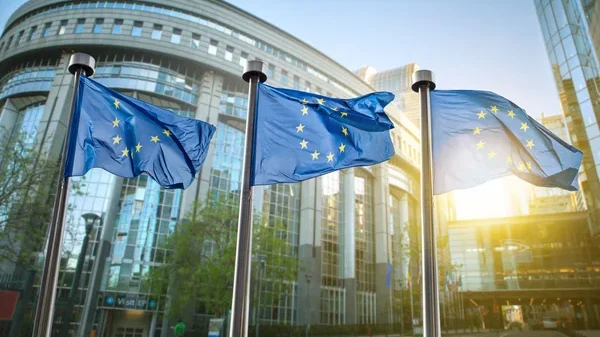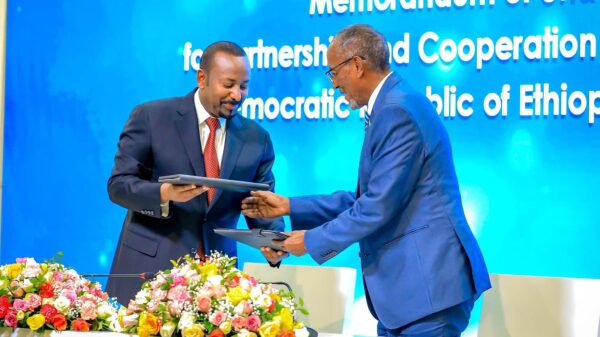Staff writer Ruth Otim covers Ghana’s recent anti-LGBTQIA+ bill and its reception amongst Ghanaian advocates, denouncers, and the international community.
With what headlines are reporting to be one the harshest anti-LGBTQIA+ bills passed in Africa, human rights activists in Ghana and internationally have denounced the new ‘Human Sexual Rights and Family Values Bill 2024’ as a dangerous step towards further stigmatizing and endangering the lives of LGBTQIA+ Ghanaians.
On February 28th, Ghana’s parliament voted in favour of the bill still awaiting President Akufo-Addo’s signature. The new piece of legislation criminalises the “wilful promotion, sponsorship, or support of LGBTQ+ activities” punishable by up to five years in prison. If signed into law, the bill will criminalise public displays of affection as well as romantic and sexual relationships for people who identify as LGBTQIA+. However, the bill does not end there, individuals and groups suspected of advocating and/or financing queer activities could also face prosecution.
This is not a new trend in Africa; this piece of legislation in Ghana is joined to a greater history of the codification of colonial heteronormativity and persecution of queer identity. This history is extensive in the continent, and an issue discussed further in Roar.
The Anti-Gay Bill
The bill has garnered wide support in the country, with the backing of the two major political parties in the parliament and a coalition of support comprising of traditional Ghanaian, Christian, and Muslim leaders. The coalition’s support for the bill, for what some now refer to as the “anti-gay bill”, legalises the discrimination many queer already Ghanaians commonly face. The difference here is that their queer identity has never been prosecuted for under colonial-era law. President Akufo-Addo stated that during his tenure, gay marriage would never be legalised in Ghana.
The piece of legislation was drafted in January 2021 as a response to Ghana’s first LGBTQIA+ community center in Accra. Religious and traditional groups placed pressure on the center, and protests against its opening resulted in the police swiftly closing it down. According to a joint statement made by the Christian Council of Ghana and the Ghana Pentecostal and Charismatic Council, the citizens of Ghana cannot accept the LGBTQIA+ community as it is “alien to the Ghanaian culture and family value system.”
Ghana’s place in Africa, considered to be a country more respectful of human rights than its African counterparts, has brought significant domestic and international denunciation with this new bill.
The proceedings of this bill would align Ghana with about 30 other African nations in their ban against same-sex relations. Certain countries such as Uganda and Mauritania have already severely criminalized the LGBTQIA+ community with possible sentences including the death penalty.
Queer Ghanaians and Human Rights Activists Speak Out
Even with the mass support for the bill, queer Ghanaians and human rights activists have been steadfast in their condemnation of the bill.
Ghana’s first openly transgender musician and activist Angel Maxine, who goes by She/her/hers pronouns, said: “My heart is broken and devastated at the moment, that’s all I can say for now.”
The Big 18, a human rights coalition comprising Ghanaian lawyers and activists has denounced the bill, noting that:
“You cannot criminalise a person’s identity and that’s what the bill is doing and it’s absolutely wrong.”
Takyiwaa Manuh, a Big 18 Coalition member
Members of the Ghanaian government have also voiced disapproval of the bill as Godref Yeboah Dame, Attorney General and Minister of Justice, has advised against the President’s passing of the bill, arguing that it would be unconstitutional. Others, such as the Chairman of the Center for Democratic Development, Audrey Gadekpo, affirmed that the rights group will consistently advocate for the dismissal of this bill, even going as far as taking the case to court.
Many more members of LGBTQIA+ activist groups and human rights advocates have voiced these concerns and denunciations, such as Alex Donkor, founder and director of LGBT+ Rights Ghana, stating that:
“The passing of this bill will further marginalise and endanger LGBTQ individuals in Ghana. It not only legalises discrimination but also fosters an environment of fear and persecution.”
Alex Donkor, Founder and Director of LGBT+ Rights Ghana
What advocates such as Angel Maxine and LGBTQIA+ activist leaders such as Alex Donkor share is a resounding fear for the liberties and safety of queer Ghanaians under this bill. Alongside this fear, they also share in sustained advocacy against the bill, asserting both the unconstitutional aspect of it and the immediacy of throwing it out.
The International Community Speaks Out
The International community maintains the position, similar to their Ghanaian peers who oppose the bill, that it “poses significant threats to the fundamental rights and freedoms of LGBTI persons” according to Amnesty International.
Numerous members of the United Nations have spoken out against the Ghanaian bill. Such include a statement made by spokeswoman for the Office of the UN High Commissioner, Ravina Shamdasani:
“Consensual same-sex conduct should never be criminalised […] The bill, if it becomes law, will be corrosive, and will have a negative impact on society as a whole.”
Ravina Shamdasani, spokeswoman for the Office of the UN High Commissioner
The UN High Commissioner for Human Rights, Volker Türk, and the head of UNAIDS, Winnie Byanyima, share in the condemnation of the Ghanian ‘Anti-Gay Bill’. Türk affirms that the intentions of the bill are “profoundly disturbing” and urged that the government of Ghana should “ensure everyone can live free from violence, stigma, and discrimination, regardless of their sexual orientation or gender identity” – an assurance that cannot be made if the legislation is signed.
Byanyima adds to this sentiment, that the reality of this bill, if it were to become law, could “incite violence against fellow Ghanaian citizens, and will negatively impact on free speech, freedom of movement and freedom of association.” She adds that such a bill may even “jeopardize Ghana’s development success.”
What is echoed by these UN representatives is that queer Ghanaians will not be the only ones affected by this bill. It negatively harms Ghana’s commitment to human rights for its citizens and ensures queer Ghanaians have to practice heteronormativity out of fear for their safety.
Byanyima goes further to argue that the harm this bill will cause to other Ghanaians’ freedoms such as of speech and association, means it does not only target queer Ghanaians, but also their allies and quite possibly those even remotely suspected of participating in LGBTQIA+ activities.
A Space for Queerness in Africa
The overarching belief that advocates for the Anti-Gay Bill have upheld, is that being queer is “alien to the Ghanian culture”, and places the importance of maintaining culture more than the protection of Ghanaian lives and freedoms.
The ‘criminal act’ of “willful promotion, sponsorship, or support of LGBTQ+ activities” perpetuates one of the most harmful and inaccurate understandings of queerness: that it is a choice. Those who identify as LGBTQIA+ and their allies know all too well the inaccuracy and the harm such an idea about queer identity has on those in the community.
Queer Ghanaians, and by extension all queer people, do not choose their sexual orientation and gender identity, nor deliberately choose to subsequently face alienation from their family, peers, and even country. This harmful misconception, paired with others perpetuated through the anti-gay bill such as the “alien” nature of queerness in Ghana is codifying homophobia with this bill. This should not only be a pressing issue for Ghanaians but also critical for all Africans and the international community.
It’s especially disheartening how current African governments such as Ghana are recycling colonial laws. The very same discriminatory measures that many Africans were harmed by during the colonial era are now being used to selectively harm Africans in post-colonial states. There should be no space for the perpetuation of colonialist governance and ideology in current African states.
Even past the links to colonialism, as Africans; as people in the 21st century, there should be no space to alienate, stigmatize, and criminalize queerness. The only alien thing within our African societies should be the discrimination of fellow Africans.

















